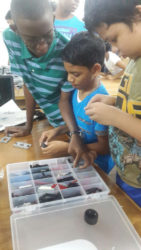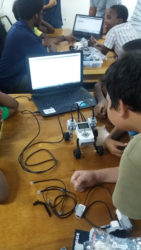The role of robotics in an evolving world—particularly in sectors such as healthcare, agriculture and governance—was highlighted yesterday at Guyana’s first ever robotics camp, held at the Saint Rose’s High School.
United States-based Technology Consultant Karen Abrams, an alumna of the high school, explained to the group of 30, mostly between the ages of 10 to 14 (although a few older ones were in attendance) the place robotics has taken in the modern world, especially in the job sector.

Bringing it close to home for participants, she made reference to the “skyrocket” in gold finds since the Canadian-owned Aurora gold mining company started operations locally, while stating that this was the result of their use of automated systems.
She also made reference to, among other things, the agricultural sector, noting that “In 20 years, if farms in Guyana do not change, they’ll be competing against massive farms that don’t really have farm hands…so the industry changes and so the type of work will have to shift.”

Abrams posited that if the students are to be prepared for Guyana and the world in ten to 15 years’ time, they would need to understand the technology that drives it.
Although only 18 students had registered for yesterday’s programme, which catered for those who were unable to get into the main camps, 30 enthusiastic pupils showed up.
Thirteen-year-old Nicholi Archer commented that “…it was good, it was educational and I guess it would benefit most of the children that came who want to do engineering in terms of robotics,” adding “nowadays it’s all about technology, the world is more advanced.”
Kaseri Persaud, who will be entering third form in September, stated, “I learnt a lot because I never knew that Legos could go that far, into engineering.” She enjoyed the creative aspect of the exercise.
The Science, Technology, Engineering and Mathematics (STEM) camp is an initiative of Abrams’ children, Ima, Caleb, Asha and Joshua Christian, the developers of the Five-O app in the US. Five-O was created to allow citizens to rate, review and track their interactions with law enforcement officers across the US.
Abrams said that this is not the first camp of this nature being conducted by the family, as they had started a similar venture four years ago in the US, targeting underrepresented communities.
“We decided to bring it here because as I look around, I see Jamaica is doing stuff with robotics and technology for their children, Trinidad just entered a competition, they’re doing stuff for their children. My kids they’re all sort of very good in this space and they said to me…why aren’t the Guyanese kids here?”
On Tuesday, workshops were held with 15 persons from various organisations who are interested in establishing STEM clubs after the completion of planned camps. Abrams indicated that the 17 Lego Mindstorm EV3 robots, which were bought for the camps and are used in Universities across the US, will be left with the trainers to continue their work.
“We wanna prepare a team that can compete on the international level in robotics by next year…Secondly, we’d like to add another component into the STEM Clubs, which is actually hands-on programming and we want to enter them into a league in the United States. Thirdly, for those kids in the STEM camps who move really fast and are really talented, we wanna be able to give them the resources to train to be able to create apps…to create mobile apps and things that can enrich their communities,” she said
As far as outcomes go, Abrams is hoping that those who are exposed to the workshops will view the world differently, and be able to use technology as a tool to find solutions.
Although yesterday’s camp just ran for one day, there are week-long camps scheduled for the week of July 25, at the St. Rose’s High School and Queen’s College and the week of August 1, in Buxton and Lusignan.




